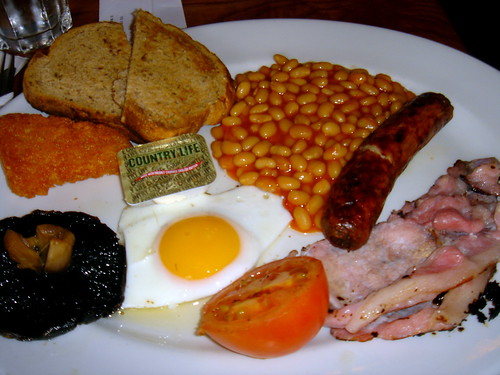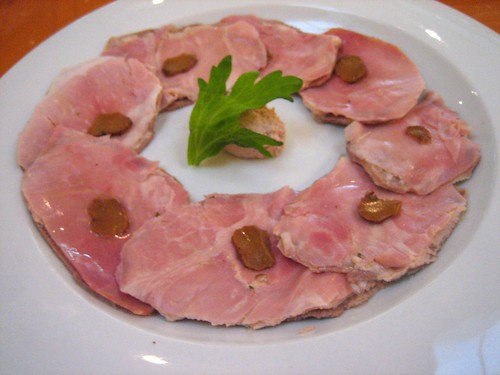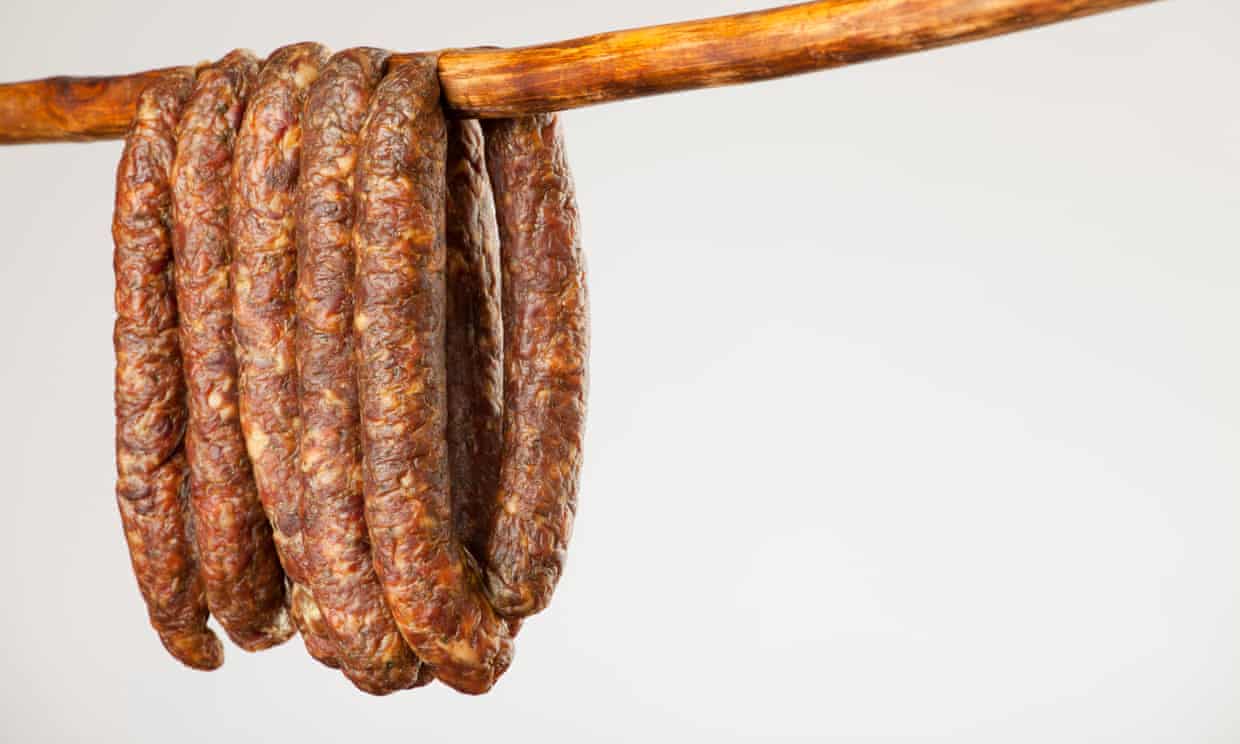Post by PinkDreams on May 2, 2008 15:58:54 GMT 1
news.bbc.co.uk/1/hi/magazine/7375606.stm
This is an interesting article regarding how Polish food may remain in UK kitchens if many Poles were to return to Poland.
Making Polish food from supermarket ingredients
By Denise Winterman and Megan Lane
BBC News Magazine
Jars of Polish baked beans and sauerkraut
What to do with these?
Many Polish immigrants are returning home, according to a report this week, but the big supermarkets have been stocking up on their native foods. Will classic dishes such as beetroot soup or pillowy dumplings, find their way into British kitchens?
It may be only adventurous British cooks who pause to peruse the mysterious jars of pickles and unfamiliar sausages that now appear in the world foods aisle of their local supermarket.
With labels printed in an unfamiliar language liberal in its use of the letters z, y and ch, these ingredients are staples of the Polish kitchen. While the bulk of sales will be to homesick Poles, some Brits are trying their hand at whipping up the comfort food that typifies Polish cuisine.
The sudden influx of Poles since their country joined the EU in 2004 has seen an explosion in Polish foods and drinks available - first in specialty shops selling to migrant workers, but now demand is so great that Sainsbury's, Asda and Tesco stock products such as pulpety (meatballs) and delicje (biscuits with chocolate and jam).
When Eva Michalik opened her Polish restaurant in west London 22 years ago, she had to travel home for certain ingredients. Now she can just pop to her local supermarket or cash and carry.
"For a long time it was hard for me to find the right ingredients and I had to improvise. But now I can get proper twarog cheese to make real Polish cheesecake."
Polish deli
Polish meats are popular with Brits too
Demand is such across the UK that Tesco has expanded its range in many stores nationwide from 250 products to 500.
"Our aim is to bring Poles – and other central Europeans – in the UK a true taste of home," says Kaskia Teofilak, the company's Polish food buyer manager. "Who knows, maybe Polish specialities will also become part of everybody's shopping.”
Steven Salamon, of Wally's Deli in Cardiff, says while Poles buy products they recognise from home, the sausages and other meats he stocks are best-sellers with all his customers.
But how to rustle up an authentic Polish meal - sour in taste and hearty in texture - from these exotic offerings?
"Cooking Polish food is not complicated and uses lots of fresh ingredients," says Eva Michalik. "Really traditional dishes include stews like bigos [see recipe below] and pierogi, a filled pasta. The majority of my customers have always been English so I know people over here have a taste for the cuisine."
BIGOS
This warming, slow-cooked stew was once a staple of hunting parties, and used whatever meat was to hand. Sauerkraut and Polish meats are now widely stocked in the UK. This recipe to serve eight comes from Wally's Deli in Cardiff, which started selling to Polish coalminers 50 years ago.
1kg jar of sauerkraut
1kg mix of beef, veal, pork or lamb
250g boczek (Polish bacon)
600g mixed Polish sausage, such as wieska, tuchowska or kilometrova
20g dried mushrooms
10 stoned prunes
10 juniper berries
10 peppercorns
10 whole allspice
Four bay leaves
Two onions
Small can of tomato paste
2 tbsp honey
One litre vegetable or beef stock
Salt and pepper
Click here for method.
USZKA (POLISH DUMPLINGS)
These mushroom-filled parcels are traditionally served atop bowls of steaming barszcz, the claret-red soup of beetroot and pickled cabbage, says Mrs Michalik.
For the dough you will need:
225g or 1/2lb plain flour
An egg
water to mix
And for the filling:
450g/1lb of dried mushrooms, soaked
An onion
25-50g/1-2 oz butter
salt and pepper
Click here for the method.
Below is a selection of your comments.
My Grandad was Polish and I've spent years trying to find a decent Polish cheese cake after he died. If they opened a restaurant round here selling that you'd never get me to leave.
Emma K, Swansea, Wales
Polish food only appeals to those with a taste for simple meat and vegetable dishes. I took an all Brit group of friends to a UK/Polish restaurant in 2001 and to-a-man they turned their noses up: "too boring, no spice and has it been cooked properly". Polish food will never go mainstream until it appears in a microwave. Feed me zurek and bigos until it comes out of my ears.
Stu Coles, York
I worked in an home for mentally handicapped in Poland on three occasions in the 1990s. We very much ate the local cuisine and I remember with affection the kielbasa (sausage), bigos (stew) pierogi ruski (Russian dumplings) and of course the beetroot soup. Whilst I don't find it surprising that Polish immigrants are demanding this food, I am slightly amused by British demand for it. I suppose that good hearty fare is the staple at heart for Brits. Personally I've never considered it especially exotic cuisine.
Jonathan, Kenilworth
I, of course, am very happy to see Polish products in supermarkets in the UK. I am also more than happy to share my recipes with my British friends. And a few Polish evenings with Polish food served (zurek and ruskie pierogi - dumplings with potato and soft cheese filling, potato pancakes or potato noodles with meat sauce, chocolate mazurek - Polish Easter cake) proved to be really successful. The name of the dumplings, uszka, actually means little ears, the name comes from their shape. Originally they are Christmas Eve dish. Wiejska sausage can be translated into countryside sausage, but for bigos I would suggest a bit of jalowcowa (juniper) sausage (sometimes it is available in the UK under the name of Bohun sausage).
Kasia, Edinburgh, Scotland
This is just the same as the influx of Indian workers introducing curry and Chinese people bringing their cuisine. I wonder how soon Polish restaurants will become a popular haunt on a Friday night? However, I doubt that many British people will start making their own Polish meals. They rarely make anything from scratch, preferring ready meals and sauces from jars.
Heather, Willenhall
My local Costcutters seems to stock more Polish food than anything else. I spend forever trying to work out what any of it is, however, and would be keen to try things if only I could work out what all these pastes and pickles and tins were. Because they're all in Polish I have no idea even what usage some of these things are for. I have long been a fan of Polish sausages, and enjoy snapping them up in the shop.
EHL, London
Of course Polish food is great and the amount and variety of meats and sausages we have is amazing and I love it all to bits. My first meal back in Poland is always good fresh sausage, fresh (real) bread and mustard. Nobody in the article above mentioned 'flaki' soup. It's a caw stomach soup. It looks like a stock full of aliens but tests like heaven. The other one is 'zurek'. You can now buy it in bags (like herbs but it's powder) and when you mix it with 'bialy barszcz' (another polish soup, also from the powder bag) you will have the best soup for cold days and hangover mornings, as it's a bit sour. Love it, Love it, Love it. My middle class British husband and mother-in-law love it too.
Ania, Manchester
I can confirm that Polish food is orgasmic. My mother in law's chicken liver stew........... ooooooooooooooooooo yummy.
Ania's middle class British husband
This sort of thing is exactly why I love the ease of movement being in the European Union provides. As more cultural mixing occurs, the spectrum of possible experiences increases. Whenever I travel abroad, I always sample the local cuisine, so I'm pleased to see other countries' additions to our menus.
DS, Croydon, England
This is an interesting article regarding how Polish food may remain in UK kitchens if many Poles were to return to Poland.
Making Polish food from supermarket ingredients
By Denise Winterman and Megan Lane
BBC News Magazine
Jars of Polish baked beans and sauerkraut
What to do with these?
Many Polish immigrants are returning home, according to a report this week, but the big supermarkets have been stocking up on their native foods. Will classic dishes such as beetroot soup or pillowy dumplings, find their way into British kitchens?
It may be only adventurous British cooks who pause to peruse the mysterious jars of pickles and unfamiliar sausages that now appear in the world foods aisle of their local supermarket.
With labels printed in an unfamiliar language liberal in its use of the letters z, y and ch, these ingredients are staples of the Polish kitchen. While the bulk of sales will be to homesick Poles, some Brits are trying their hand at whipping up the comfort food that typifies Polish cuisine.
The sudden influx of Poles since their country joined the EU in 2004 has seen an explosion in Polish foods and drinks available - first in specialty shops selling to migrant workers, but now demand is so great that Sainsbury's, Asda and Tesco stock products such as pulpety (meatballs) and delicje (biscuits with chocolate and jam).
When Eva Michalik opened her Polish restaurant in west London 22 years ago, she had to travel home for certain ingredients. Now she can just pop to her local supermarket or cash and carry.
"For a long time it was hard for me to find the right ingredients and I had to improvise. But now I can get proper twarog cheese to make real Polish cheesecake."
Polish deli
Polish meats are popular with Brits too
Demand is such across the UK that Tesco has expanded its range in many stores nationwide from 250 products to 500.
"Our aim is to bring Poles – and other central Europeans – in the UK a true taste of home," says Kaskia Teofilak, the company's Polish food buyer manager. "Who knows, maybe Polish specialities will also become part of everybody's shopping.”
Steven Salamon, of Wally's Deli in Cardiff, says while Poles buy products they recognise from home, the sausages and other meats he stocks are best-sellers with all his customers.
But how to rustle up an authentic Polish meal - sour in taste and hearty in texture - from these exotic offerings?
"Cooking Polish food is not complicated and uses lots of fresh ingredients," says Eva Michalik. "Really traditional dishes include stews like bigos [see recipe below] and pierogi, a filled pasta. The majority of my customers have always been English so I know people over here have a taste for the cuisine."
BIGOS
This warming, slow-cooked stew was once a staple of hunting parties, and used whatever meat was to hand. Sauerkraut and Polish meats are now widely stocked in the UK. This recipe to serve eight comes from Wally's Deli in Cardiff, which started selling to Polish coalminers 50 years ago.
1kg jar of sauerkraut
1kg mix of beef, veal, pork or lamb
250g boczek (Polish bacon)
600g mixed Polish sausage, such as wieska, tuchowska or kilometrova
20g dried mushrooms
10 stoned prunes
10 juniper berries
10 peppercorns
10 whole allspice
Four bay leaves
Two onions
Small can of tomato paste
2 tbsp honey
One litre vegetable or beef stock
Salt and pepper
Click here for method.
USZKA (POLISH DUMPLINGS)
These mushroom-filled parcels are traditionally served atop bowls of steaming barszcz, the claret-red soup of beetroot and pickled cabbage, says Mrs Michalik.
For the dough you will need:
225g or 1/2lb plain flour
An egg
water to mix
And for the filling:
450g/1lb of dried mushrooms, soaked
An onion
25-50g/1-2 oz butter
salt and pepper
Click here for the method.
Below is a selection of your comments.
My Grandad was Polish and I've spent years trying to find a decent Polish cheese cake after he died. If they opened a restaurant round here selling that you'd never get me to leave.
Emma K, Swansea, Wales
Polish food only appeals to those with a taste for simple meat and vegetable dishes. I took an all Brit group of friends to a UK/Polish restaurant in 2001 and to-a-man they turned their noses up: "too boring, no spice and has it been cooked properly". Polish food will never go mainstream until it appears in a microwave. Feed me zurek and bigos until it comes out of my ears.
Stu Coles, York
I worked in an home for mentally handicapped in Poland on three occasions in the 1990s. We very much ate the local cuisine and I remember with affection the kielbasa (sausage), bigos (stew) pierogi ruski (Russian dumplings) and of course the beetroot soup. Whilst I don't find it surprising that Polish immigrants are demanding this food, I am slightly amused by British demand for it. I suppose that good hearty fare is the staple at heart for Brits. Personally I've never considered it especially exotic cuisine.
Jonathan, Kenilworth
I, of course, am very happy to see Polish products in supermarkets in the UK. I am also more than happy to share my recipes with my British friends. And a few Polish evenings with Polish food served (zurek and ruskie pierogi - dumplings with potato and soft cheese filling, potato pancakes or potato noodles with meat sauce, chocolate mazurek - Polish Easter cake) proved to be really successful. The name of the dumplings, uszka, actually means little ears, the name comes from their shape. Originally they are Christmas Eve dish. Wiejska sausage can be translated into countryside sausage, but for bigos I would suggest a bit of jalowcowa (juniper) sausage (sometimes it is available in the UK under the name of Bohun sausage).
Kasia, Edinburgh, Scotland
This is just the same as the influx of Indian workers introducing curry and Chinese people bringing their cuisine. I wonder how soon Polish restaurants will become a popular haunt on a Friday night? However, I doubt that many British people will start making their own Polish meals. They rarely make anything from scratch, preferring ready meals and sauces from jars.
Heather, Willenhall
My local Costcutters seems to stock more Polish food than anything else. I spend forever trying to work out what any of it is, however, and would be keen to try things if only I could work out what all these pastes and pickles and tins were. Because they're all in Polish I have no idea even what usage some of these things are for. I have long been a fan of Polish sausages, and enjoy snapping them up in the shop.
EHL, London
Of course Polish food is great and the amount and variety of meats and sausages we have is amazing and I love it all to bits. My first meal back in Poland is always good fresh sausage, fresh (real) bread and mustard. Nobody in the article above mentioned 'flaki' soup. It's a caw stomach soup. It looks like a stock full of aliens but tests like heaven. The other one is 'zurek'. You can now buy it in bags (like herbs but it's powder) and when you mix it with 'bialy barszcz' (another polish soup, also from the powder bag) you will have the best soup for cold days and hangover mornings, as it's a bit sour. Love it, Love it, Love it. My middle class British husband and mother-in-law love it too.
Ania, Manchester
I can confirm that Polish food is orgasmic. My mother in law's chicken liver stew........... ooooooooooooooooooo yummy.
Ania's middle class British husband
This sort of thing is exactly why I love the ease of movement being in the European Union provides. As more cultural mixing occurs, the spectrum of possible experiences increases. Whenever I travel abroad, I always sample the local cuisine, so I'm pleased to see other countries' additions to our menus.
DS, Croydon, England








 SHe prefers to buy tasty home made pierogis sold in our local supermarket.
SHe prefers to buy tasty home made pierogis sold in our local supermarket. 
 Now I'm hungry and will have to go and make something...but all delicious looking dishes (well, maybe not things like the tongue...) ;D
Now I'm hungry and will have to go and make something...but all delicious looking dishes (well, maybe not things like the tongue...) ;D









